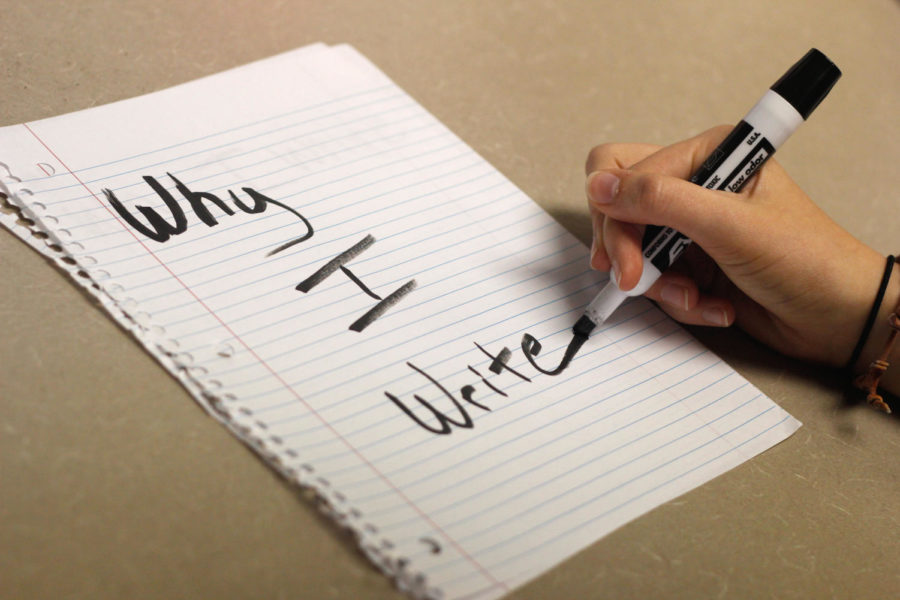Glawe: Why I Write
Brian Achenbach/Iowa State Daily
Writing gives us more than an instrument by which we communicate thoughts and ideas. It also provides the avenue by which our words create perspective, and in doing so, we make an incomprehensible world comprehensible.
September 29, 2013
A sobering fact about writing for a college newspaper is only a small portion of the student population will actually care enough to read your piece. Even more disheartening is the likelihood that many of those who commit to reading will only survive halfway through the column before moving onto something “more exciting.” The futility of the whole matter gives way to endless scoff and scorn.
In response, I say, “Good.” As a warrior of the opinion section, my conditions for victory demand very little. If what I write affects the perception of one measly individual, just one, I will be supremely happy.
Although it can be quite difficult to gauge the size of my audience (I presume it to be meager) or the potency of my voice, there are much greater reasons to apply pen to paper. As the character V from the movie “V for Vendetta” declares: “Words offer the means to meaning and, for those who will listen, the annunciation of truth.”
Writing gives us more than an instrument by which we communicate thoughts and ideas. It also provides the avenue by which our words create perspective, and in doing so, we make an incomprehensible world comprehensible. Shortly, as Robert Mckee put it, “making sense out of the chaos.”
In a way, writing is our very being. Veterans of the trade, only in different forms, tell young writers: “You must find your voice.” No writer would find this to be idle talk.
Personally, I don’t think I could function properly if I were to lose my capacity to write. But this dependency is not by my choosing. As my favorite writer Christopher Hitchens once said: “If you’re going to write, it must not be that you want to do it, or would like to do it, it must be a thing you have to do — it must be the thing that without which you cannot live.”
There is no opting out of it — writing is apart of me as much as breathing. Oddly, I feel liberated.
Some will cut to the quick and say: “Well, why don’t you keep your writing to yourself then?” Well, I could certainly keep my mouth shut and write in a diary all day or, dare I say, start a blog, but what is the point in a “perspective” if it cannot be shared?
As a columnist, I like telling a story under a fresher context, while fortifying the underlying argument. I enjoy even more the nights I spend hacking to pieces the popular narrative only to rebuild it into something not of redundancy or plagiarism, but a beast entirely of its own. That is worthwhile to me.
It must be admitted, though, that I have a not so subtle obsession with argument (as probably indicated in my last column about Socrates). However, my wish to cull the minds of the readers is not always satisfied. Upon submitting my piece to the editor, the die is cast — my credibility then rests upon the fair-minded. The reception is never fully anticipated, even with my best columns, but it is the contribution to the conversation that is important.
I have been driven to insanity wondering if anyone is actually listening to what I have to say. What impact can a mere college student have on national discussions anyway? While I have a nasty tendency to, as they say, “punch above my weight,” it is my hope both to inform and to persuade my fellow students with the smidgen of experience I do have.
Last week, I was sitting outside of the library, drinking my vanilla latte and listening to more of the charlatan drivel I deeply loathe. Earlier that week I had submitted a column decrying these religious hucksters ruining the free-speech zone. My intent was to inspire students to argue like Socrates. To my delight, students stopped to argue with the man, wielding the Socratic method as their weapon of choice.
One of these students was a colleague of mine, who, after dancing the man into a logical trap, told me he had done so in the spirit of my column.
When asked what impact my writing could possibly have and if it is even worth it, I am reminded of the ending scene to the movie “Cloud Atlas.” The stern Haskell Moore mutters: “And for what? For what? No matter what you do, it will never amount to anything more than a single drop in a limitless ocean.” To which Adam Ewing responds: “What is any ocean but a multitude of drops?”







